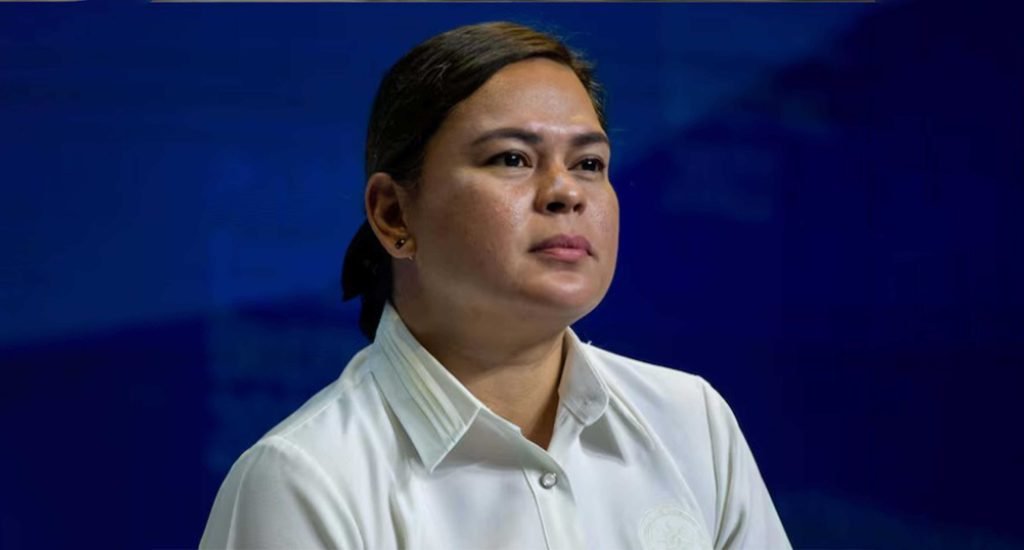Philippines VP Sara Duterte’s Assassination Threat Sparks National Security Concerns
- Abeera Marium Siddiqui
- November 25, 2024
- 12:13 pm
- 28
- Trending

The Philippines is reeling after Vice President Sara Duterte’s explosive comments set off alarm bells across the nation. In a profanity-laden press conference, Duterte revealed that she had spoken with an assassin and instructed them to kill President Ferdinand Marcos Jr., his wife Liza Araneta, and Speaker Martin Romualdez if she were ever killed.
“I said, if I get killed, go kill BBM (Marcos), (first lady) Liza Araneta, and (Speaker) Martin Romualdez. No joke. No joke,” Duterte said bluntly. She didn’t stop there, accusing Marcos of being an ineffective leader, adding, “This country is going to hell because we are led by a person who doesn’t know how to be a president and who is a liar.”
Her words have sparked shock and scrutiny, raising serious concerns about the rift between two of the country’s most powerful political figures.
Security Measures Tightened
The government wasted no time responding. Marcos’ Presidential Security Command immediately ramped up safety measures, issuing a statement that security protocols had been “heightened and strengthened.” Police Chief Rommel Francisco Marbil ordered a swift investigation, emphasizing that “any direct or indirect threat to his life must be addressed with the highest level of urgency.”
National Security Adviser Eduardo Ano called Duterte’s comments a matter of national security. “Any and all threats against the life of the president shall be validated and considered a matter of national security,” Ano said.
Despite the urgency of the response, Duterte seemed unfazed, later remarking, “Thinking and talking about it is different from actually doing it.”
A Collapsed Political Alliance
Duterte’s remarks highlight the collapse of what was once a powerful political alliance. In 2022, Duterte and Marcos joined forces, securing decisive election victories that cemented their status as the country’s two most influential leaders.
However, cracks in their partnership began to show this year. Policy disagreements, particularly over foreign relations and Rodrigo Duterte’s controversial war on drugs, drove a wedge between them. The tension boiled over when Speaker Romualdez, a cousin of Marcos, slashed Duterte’s office budget by nearly two-thirds. Duterte’s resignation from her cabinet post in June marked the final unraveling of their alliance.
Since then, Duterte hasn’t held back. In October, she accused Marcos of incompetence and admitted imagining “cutting the president’s head off.” Her latest remarks are the most shocking yet, exposing the full extent of the animosity between the two camps.
A Nation on Edge
Duterte’s comments add to a long history of political volatility in the Philippines. The 1983 assassination of opposition leader Benigno Aquino still casts a shadow over the nation’s politics. Duterte’s remarks, though hypothetical, have reignited fears of violence and instability.
With midterm elections looming in May, the timing couldn’t be worse for Marcos. The elections are seen as a critical test of his leadership and political strength. Duterte’s fiery rhetoric threatens to undermine him further, as her supporters rally behind her defiant stance.
What’s Next?
The feud between Marcos and Duterte has pushed the Philippines into uncharted waters. While Duterte has tried to downplay her remarks by separating talk from action, the damage is done. Her words have shaken the political landscape, raising questions about what lies ahead for the country’s leadership.
For now, the focus remains on securing the president and his family while navigating a political storm that shows no sign of letting up. As the rift deepens, one thing is clear: Philippine politics has entered a new and volatile chapter.



